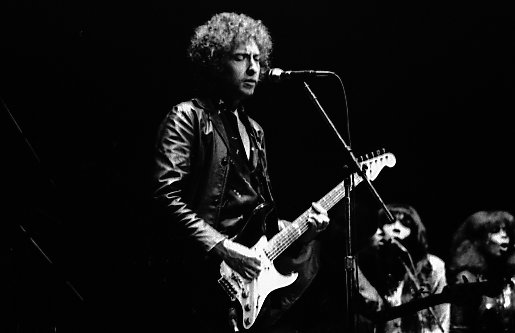
Bob Dylan. Wikimedia Commons, Licensed under CCO 2.0.
This week, The Review is publishing a series of short reflections on love songs—broadly defined.
Someone once accused me of being unrealistic about love’s aftermath. This was in the middle of an interminable argument, one in a long series of interminable arguments. I am not really someone prone to interminable arguments, which probably should have told me something about this person and myself sooner than it did, but at the time I was experiencing a new experience and not every aspect of it was entirely unpleasant. What he said was something like this: “You think there are never any consequences! You think you can go around hurting people, and that everyone you hurt will still want to be in the same room as you, having a drink!” I thought about this for a second. It wasn’t true but it wasn’t not true either. Then I said something stupid, which was, “Do you know the Bob Dylan song ‘Mississippi’?”
Is “Mississippi” a love song? Yes and no. I think it is among the most romantic songs ever written and also among the most ambiguous, which are not disconnected qualities. It is not even clearly about a romantic relationship—some people hear it as a sociopolitical song about the state of America, which isn’t wrong. It might be about a guy who has literally stayed in Mississippi a day too long. Yet it contains, I think, every important kernel of wisdom about love and the loss of it; it hits every note that matters. Is that too much to believe about a single song? “Mississippi”—and I am talking about the Love and Theft version, the heart likes what it likes—is about the love that outlasts love. I think often of the line: “I’ve got nothing but affection for all those who’ve sailed with me.” And I think, Yes, that’s how I feel! This is true!
Of course, it isn’t true. It isn’t any more true for me than it is for anyone who harbors their own bitternesses toward me. I have plenty of things besides affection—wells of pain, streaks of anger, pain and anger about things so long past you would think they would have disappeared rather than calcified. And yet when I hear that line I think about everyone I have ever loved and everyone who has ever loved me—I think of us on a boat together, maybe drinking martinis. But it’s almost like we are ghosts, like the dead children in the final book of The Chronicles of Narnia, because I know this is a wild, impossible fantasy of the past and the present colliding. Still, it’s beautiful and in its own way even comforting.
But then there is the sadder part of this song, which I can’t ignore. There are those heartbreaking lines, “I know you’re sorry / I’m sorry too”—and who isn’t sorry too? Then: “Last night I knew you / tonight I don’t.” Dylan sings those lines in a kind of mournful howl that in certain moods can bring tears to my eyes. After all, more often than not, we become strangers to each other. These lines are truer, probably, than my fantasy of undying affection, though they coexist with it; these things are not mutually exclusive but in fact inextricable. The magic of the song is its ability to contain all of this.
“Mississippi” is a song about longing—overlapping and conflicting kinds of longing. So I suppose what I was asking when I asked this person if they knew the song “Mississippi” was: Do you not understand that I can want everything all at once, even things that contradict each other? Do you not understand that these conflicts and tensions are at the heart of romantic love? And do you not believe, as I do, that love’s shadow extends long past these bitter arguments, and that is what makes it worthwhile and also why it is making us suffer? But I didn’t say those things; instead, I found myself talking about a song. The argument ended in exhaustion, and not too long afterward, we parted ways for good. But what is for good? The past is a tickertape running underneath the present. There are those other perfect lines from the song: “I was thinking about the things that Rosie said / I was dreaming I was sleeping in Rosie’s bed.”
Sophie Haigney is the web editor at The Review.
from The Paris Review https://ift.tt/Fmtcaod
Comments
Post a Comment